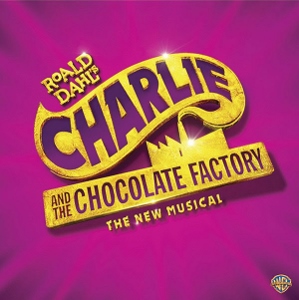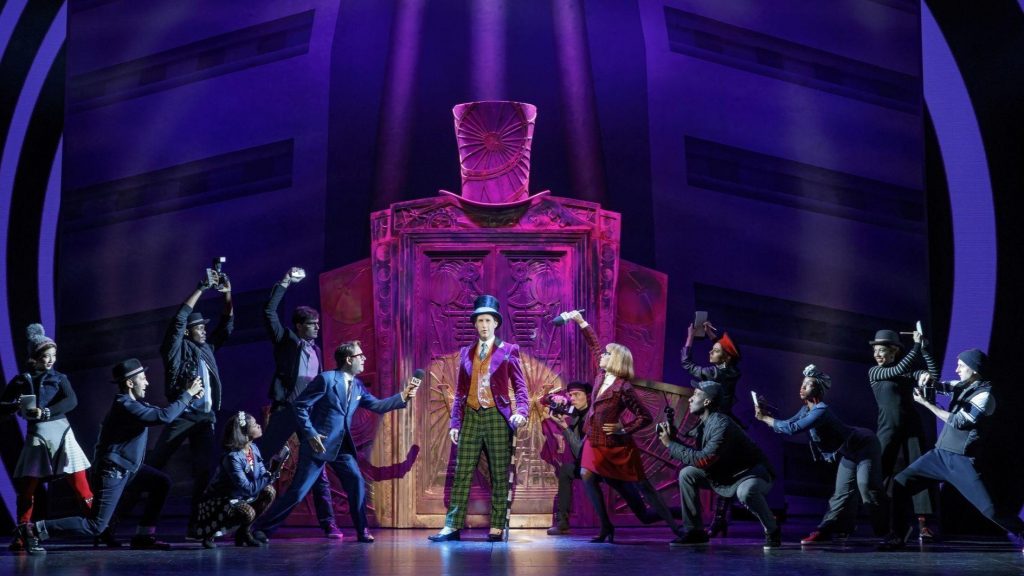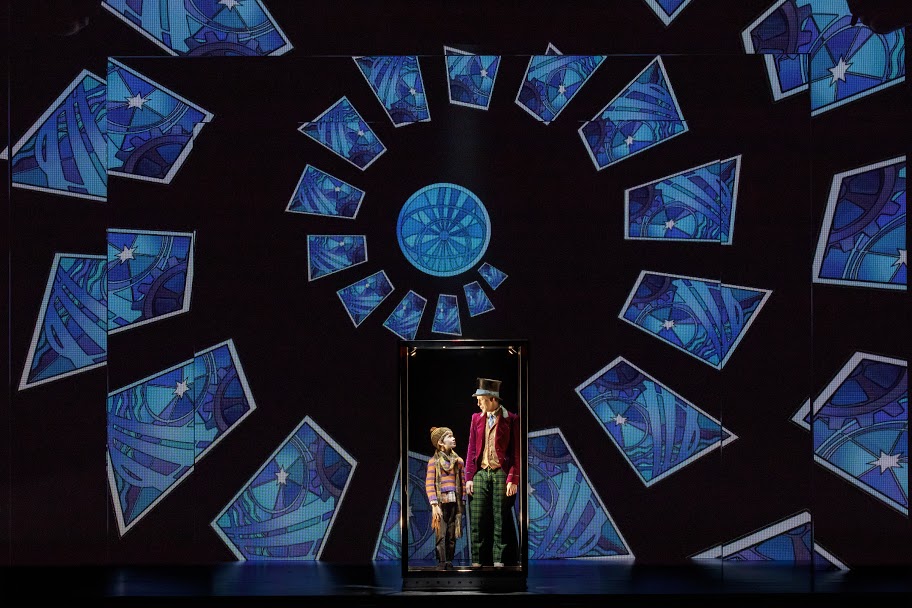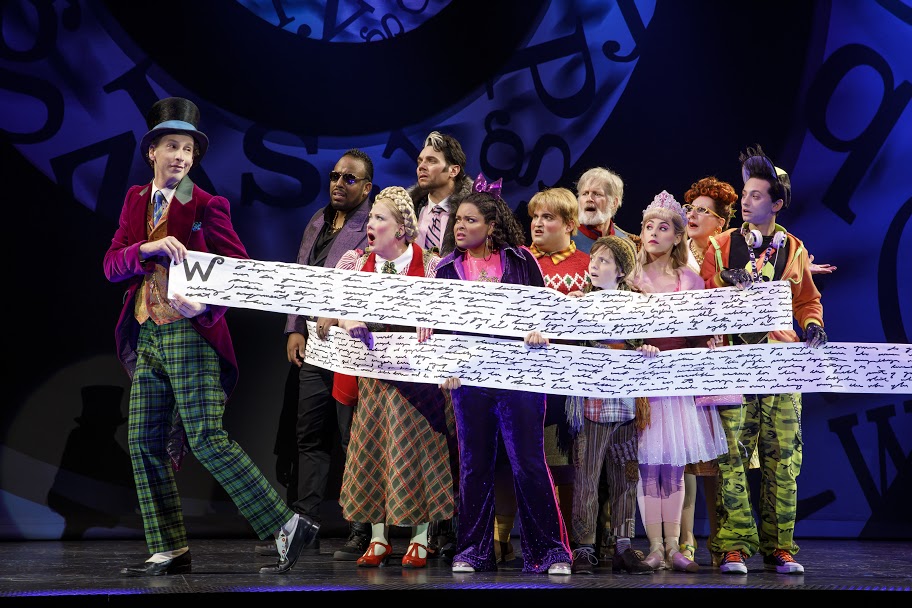MORE LIKE A SILVER TICKET
Saccharinity, like speed, can kill: The guilty pleasure of loving chocolate can, it seems, cover a multitude of sins. Harnessing “pure imagination” as well as a sweet tooth, the 2013 British musical Charlie and the Chocolate Factory milks, so to speak, Roald Dahl’s 1964 children’s novel. This adored adventure, of course, connects a deserving but poor boy with Willie Wonka, a confectionary serial killer (if you judge by results, not intention) who’s seeking a successor.
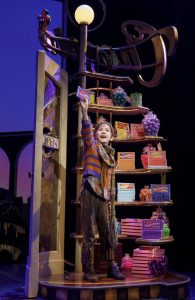 Now embarked on a Broadway tour hysterically but hilariously helmed by Jack O’Brien, this hyperglycemic spinoff –book by David Grieg, music by Marc Shaiman and lyrics by Shaiman and Scott Wittman (creators of Hairspray) — is a slyly stylized, inexhaustibly perky, and gleefully insistent exercise in high-stepping hijinks. Happily, or warily, it seldom drops its energy to expose its more sinister subtext.
Now embarked on a Broadway tour hysterically but hilariously helmed by Jack O’Brien, this hyperglycemic spinoff –book by David Grieg, music by Marc Shaiman and lyrics by Shaiman and Scott Wittman (creators of Hairspray) — is a slyly stylized, inexhaustibly perky, and gleefully insistent exercise in high-stepping hijinks. Happily, or warily, it seldom drops its energy to expose its more sinister subtext.
A reclusive and childless eccentric holed up in a shuttered factory, Willie Wonka (mercurial Noah Weisberg), immortalized by Gene Wilder and copied by Johnny Depp, is the world-famous inventor of the Everlasting Gobstopper, among other constant candies. After 17 ½ years of operation, “The Candy Man” — Leslie Bricusse and Anthony Newley’s song wisely retained from the first film — decides to conceal within his treats five “Golden Tickets” to the reopening of his factory. He hopes to audition a second owner who shares his zest for yummy profits and delight in discovery (and possibly his indifference to calamity).
Here’s where Charlie — who now makes the title — comes in. An amateur tinkerer with imagination to spare, Charlie Bucket (on opening night, adorable Henry Boshart) is a likable lad with a loving mom (Amanda Rose, endearing in “If Your Father Were Here”). Willie’s beloved Grandpa Joe (James Young), now confined to a big bed with the other three grandparents (Jennifer Jill Malenke, Claire Neumann and Benjamin Howes), used to work in the factory and cherishes the memory of giving dentists a reason to drill. Excited by the chance to glimpse the wonders within, good-hearted Charlie remains too humble to expect to enjoy the unearned fortune of a golden ticket. But, seemingly through a deserving deed, he does.
Much less meritorious, and accompanied by odious parents (Kathy Fitzgerald, Nathaniel Hackmann, David Samuel, and Madeleine Doherty), the other four winners — played, significantly, by adults — are advance caricatures of grown-up excess. We meet, or endure, the execrably obese Teutonic tot Augustus Gloop (Matt Wood) of whom there’s “More of Him to Love”; the spoiled-rotten Russian ballerina/brat Veruca Salt (Jessica Cohen); Violet Beauregarde (Brynn Williams), a vacuous, gum-chewing valley girl in “Queen of Pop”); and video gamer and slacker Mike Teavee (Daniel Quadrino), “That Little Man of Mine.” Each will meet an appropriately sardonic, if scrumptious, fate in the second-act tour of Willie’s not so fun-filled factory.
Powered by a diminutive slave horde called Oompa Loompas, that mysterious abode is perfectly pictured in Mark Thompson’s eye-popping flying scenery and equally extravagant costumes, Jeff Sugg’s wizard digital projections and Basil Twist’s puppetry and other illusions. It’s replete with Willie’s industrial-strength make-believe (“Pure Imagination,” also imported from the movie). But, alas, most of W.W.’s devious contraptions are lethally unregulated, triggering suitably sadistic nemeses for four horrible whelps.
It all culminates in a glass elevator (“The View from Here”) that displays for the sole surviving ticket-holder his future tasty empire.
For all the musical’s technical trickery and free-floating fun (crisply choreographed by Joshua Bergasse), it’s scary how much a merry mogul’s candy factory resembles the Gingerbread House of Hansel and Gretel’s wicked witch, another toddler trap. There’s danger in this dream factory. Weisberg’s Willie, a tad more calculating than Wilder’s already child-like calorie king, fulfills wishes the way the devil makes deals. And, if Charlie is really meant to be the next Willie, his bedrock innocence may well prove an insuperable liability.
So, before a riotous curtain call ends the excitement, Charlie and the Chocolate Factory has become a conditional charmer, its heart and humanity not altogether indisputable (and with a somewhat sloppy sound system). You pay a price for unquestioningly embracing Willie’s ruthless concept of pure imagination. There’s nothing particularly pure about four doting if misguided parents losing their admittedly toxic offspring. Is an Everlasting Gobstopper worth the candy carnage? Well, as the song rightly puts it, “It Must Be Believed to Be Seen.”
photos by Joan Marcus
Charlie and the Chocolate Factory
national tour
presented by Broadway in Chicago
at the Oriental Theatre until October 21, 2018
for tickets, call 800.775.2000 or visit Broadway in Chicago
tour continues through September, 2019
for tickets, visit Charlie
